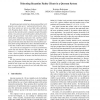148 search results - page 10 / 30 » Self-stabilization of Byzantine Protocols |
EUROPAR
2004
Springer
14 years 1 months ago
2004
Springer
Abstract. Distributed protocols resilient to Byzantine failures are notorious to be costly from the computational and communication point of view. In this paper we discuss the role...
ICALP
2004
Springer
14 years 3 months ago
2004
Springer
In order to enable communication between a dynamic collection of peers with given ID’s, such as “machine.cs.school.edu”, over the Internet, a distributed name service must b...
ICDCS
2006
IEEE
14 years 3 months ago
2006
IEEE
Byzantine quorum systems have been proposed that work properly even when up to f replicas fail arbitrarily. However, these systems are not so successful when confronted with Byzan...
WDAG
2004
Springer
14 years 3 months ago
2004
Springer
In a Byzantine agreement protocol, a synchronous network of n interconnected processes of which t may be faulty, starts with an initial binary value associated with each process; a...
DSN
2000
IEEE
14 years 2 months ago
2000
IEEE
Byzantine quorum systems [13] enhance the availability and efficiency of fault-tolerant replicated services when servers may suffer Byzantine failures. An important limitation of...

